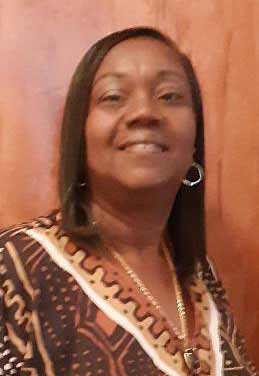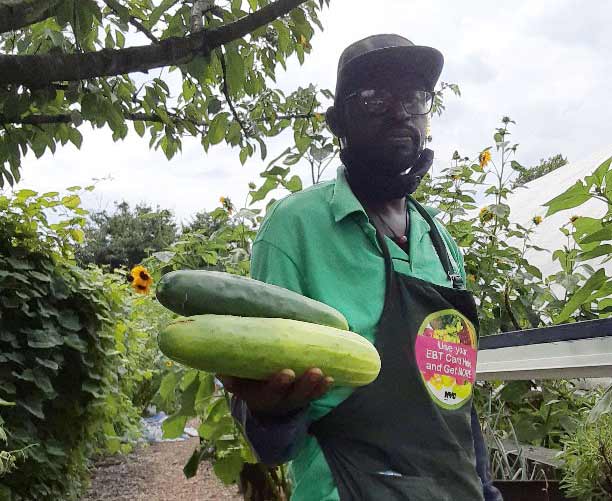By Mary Alice Miller
Brownsville is considered a food desert, with 15 corner stores/bodegas to every one supermarket. Brownsville is also a food swamp, with a concentration of high-calorie fast food slightly behind East New York, the biggest swamp in New York City.
“Eating healthy is not expensive,” said Brenda Thompson-Duchene, who manages Powell, Green Valley, and Isabahlia Community Gardens in Brownsville. “I want the community to leave fast foods alone. I dream of outdoor sitting areas with healthy foods.”
In 2022, the three gardens grew 1,599 pounds of vegetables, as well as jelly and jams, herb teas, and eggs. The gardens provide fresh fruit and vegetables to the Brownsville Community Culinary Center. Students come to the gardens to see where the food they cook comes from.

Thompson-Duchene started community gardening in 2010. “I started the garden by helping seniors at Powell Garden 410 Livonia Avenue. I was doing Healthy Choice workshops, which I still do. One of the seniors who attended my workshop asked me to come and help her at the garden,” said Thompson-Duchene.
After GreenThumb saw what she was doing, they offered her 93 New Lots Avenue Green Valley Garden. Guilani put into effect ‘Use the garden or lose it’. 93 New Lots Avenue, Green Valley, was about to be taken back. GreenThumb did not want to lose the site, so they approached her and asked if she would take over. The same happened at Isabahlia Garden at 615 Saratoga Avenue, and the Student Farm 514 Rockaway Avenue.
Local schools come in and have plots in the student garden. The students will sow the seeds, and by the time the seedlings come up by May they come and plant them in the garden and see how they grow. When the kids came back in September, they were excited to harvest their produce.
At first, the students were not interested in vegetables that were out of the ordinary and did not come from a fast food place. What Thompson-Duchene did with the vegetables was either to stir fry or make a smoothie. “One of the things I always tell my students, ‘don’t look at it and say I don’t like it. Have you ever tried it? ‘No.’ Well, how do you know you don’t like it,” said Thompson-Duchene. “So everybody gets to be a little taster. That is one thing with my program: if you are not willing to taste, you cannot participate in my program. This is the only way we are going to get the kids exposed. The students say, ‘Oh, wow! Can I have some more?”
The gardens had no farmers market during COVID. “COVID was really a devastating time for so many families that lost loved ones, lost their jobs. So what we did was we had a weekly market. Every week anybody could have come. We had vegetables in crates, and you pointed to what you wanted so we could be as safe as possible. We had spinach, kale, Swiss chard, bell peppers, cucumbers, and tomatoes. We had apples, pears, and cherries from our fruit trees and our Powell Street garden,” said Thompson-Duchene. “We were able to help the community. We went back to the village during COVID because people were helping people.”
Thompson-Duchene described the pandemic aftermath. “We lost so many young people because of the fast food syndrome,” said Thompson-Duchene. “They just don’t cook anymore. They give their kids a couple of dollars, and they stop at the fast food store or buy a quarter water. Why would you eat something that somebody doesn’t eat but is selling to you?”
Thompson-Duchene offers Healthy Choices Workshops to the community, and any organization, school, or church can invite us to come in and do a 6-week workshop.
“We encourage leaving salt alone, and using herbs. We have a lot of herbs that you can flavor your food with. You can make a nice cool drink with the same herbs that you flavor your food with, or in the winter, you can make a warm drink such as tea. You can make a thyme drink, rosemary, basil, lemon balm, and lemongrass.”
The garden is closed to the public during the winter. “We grow herbs in the greenhouse during cold months. We dry the herbs and make the tea bags we sell year-round.”
“I am a beekeeper, so we sell honey. The bees are at Green Valley Garden,” said Thompson-Duchene. “The gardens have fresh brown eggs that we sell. The chickens are at Isabahlia Garden.”
The community can come to use a raised bed to grow their stuff for a small annual fee to support our on-site port-a-potty. People can plant what they bring, or the gardens provide small seedlings. The season is from May to October.
“We have people who appreciate that they can buy fresh, locally grown vegetables in season,” said Thompson-Duchene. “We can help you eat very healthily.”
The Farmer’s Markets officially opens July: 514 Rockaway Avenue (Friday and Saturday) and 410 Livonia (Sat morning). anyone in the community that wants to participate in Healthy Choices Workshops via zoom can email Isabahlialoef@aol.com for the schedule.


